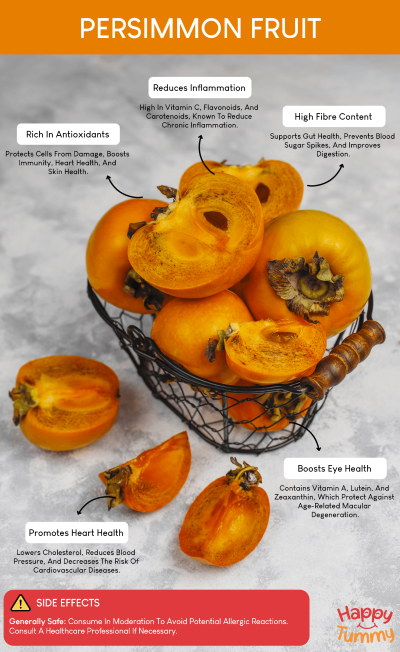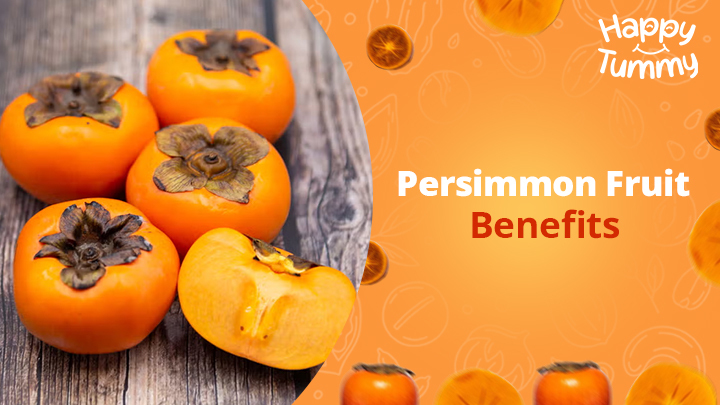Table of Contents
Sometimes we all crave for a delicious fruit on the table. An exotic delicacy! There are also days when we want to bring a nutritional twist to our diet with something that helps us maintain good health. But what if we tell you about a fruit that will not only make you swoon with its blissful taste but will also bless you with good health? We are talking about persimmon.
Persimmon might not be native to India, but its tempting benefits are pushing its demand well. Ancients used it to treat blood sugar issues, enhance eye health, and for overall health benefits. But how much of it is proven? We’ll explore just that.
Today, we’ll pick up persimmon, extract its numerous benefits, tell if there are any side effects, and sprinkle it with a bit more useful information.
Know Your Persimmon – History, Names, and Nutrition
Persimmon fruit is native to China. It has been growing there for thousands of years and has a rich history. The reason? It’s good fulsome fruit. Its look might fool you into believing that it’s a tomato. It looks almost similar except for its colour, which is bright reddish-orange.
Scientifically Known as Diospyros kaki, Persimmon is an ancient fruit tree, belonging to the family Ebenaceae.
But what about its texture?
Take a persimmon, cut it in half, and you’ll see a soft, jelly-like texture. Take one half, put it in your mouth, and you’ll sense a juicy, honeyed sweetness with hints of apricot. It is that delicious. If it tastes bitter and astringent, mark it as unripe.
Now, a bit about its nutrition:
Persimmon is an exotic fruit that is nutrient-dense. It’s not only a vitamin B beauty but contains several other essential nutrients. Let’s have a look:
| Persimmon Nutritional Benefits (per 100 grams) [1][2] | |
| Nutrient | Amount |
| Calories | 127 Kcal |
| Water | 64.4 grams |
| Carbohydrates | 33.5 grams |
| Fibre | 3.6 grams |
| Protein | 0.8 grams |
| Fat | 0.4 grams |
| Vitamins | Folate, Choline, Vitamin C(66 mg), Vitamin K(2.6 µgVitamin A RAE(81µg) |
| Minerals | Calcium(27 mg), phosphorus(26 mg), potassium(310 mg), etc. |
| Phytonutrients | Beta Carotene (253µg), Cryptoxanthin, Lutein+ Zeaxanthin (834 µg) |
The many minerals, vitamins, and bountiful antioxidants make it a true temptation. And when you learn about its benefits, you’re going to give it all you got. So, let’s slice it down.
Persimmon Fruit Benefits
Persimmon is a nutritional beauty stuffed with lots of antioxidants such as Tocopherols, polyphenols and Carotenoid. It also offers some precious and promising bioactive molecules such as proanthocyanidin, anthocyanidin, catechin, flavonoids, lutein, etc. These fuel most of the health benefits it offers. Here are some proven persimmon benefits:

1. Persimmon Fruit: Rich in Antioxidants
Persimmon is a fount of antioxidants that help our health. But how? Antioxidants are compounds that protect cells from damage caused by free radicals, helping to prevent oxidative stress and promote overall health. Free radicals are unstable molecules known to contribute to many health problems such as
- Premature ageing
- Cardiovascular & Inflammatory Diseases
- Skin damage
- Lost immunity
- Tissue Damage, etc.
Antioxidants have been well proven to not only enhance skin health but even strengthen immunity, improve memory, protect the heart, etc. [3]
Persimmon is especially rich in flavonoids that is found in its flesh and skin. Here is what science says why flavonoids are important to us:
They function as antioxidants and exert anti-inflammatory effects in the cardiovascular system by modulating inflammatory response and signalling pathways, thus helping to enhance heart and lung health.[4]
The neuroprotective actions of dietary flavonoids protect neurons from neurotoxins, aid in suppressing neuroinflammation, and also have the potential to promote memory, learning and cognitive function.
2. Persimmon Fruit: Reduces Inflammation
Inflammation is the body’s immune system’s response to an irritant. It is a part of the body’s defense mechanism. They are usually acute or chronic. It is the chronic inflammation that is long term and lasts for prolonged periods. A persistent chronic inflammation may lead to the development of various degenerative diseases. Thus, consuming a balanced diet with foods containing anti-inflammatory properties is extremely vital.
Persimmon’s excellent vitamin C content may help reduce inflammation. Vitamin C is reported to have potential effects in alleviating inflammations. 100gms of Persimmon can provide you with around 82.5% of your daily vitamin C requirement. Great!
But how?
Vitamin C acts as an antioxidant and antioxidants are known to reduce inflammation in the body. They contribute to maintaining the integrity of cells and thereby protects them against reactive oxygen species generated during an inflammatory response, They may also contribute to immune defense by supporting various cellular functions of both the innate and adaptive immune systems. [5]
Vitamin C is not the only nutrient present in persimmon that fights inflammation. There are other flavonoids, carotenoids, and vitamin E. All these are known to reduce inflammation and provide better health.
3. Persimmon Fruit: Full of fibre
Persimmon benefits our health with its excellent fibre content as well. A 100 grams of persimmon provides us with around 3.6 grams fibre. But why fibre?
Dietary fibre can act as prebiotics—substances that nourish the bacteria, or microflora, in the gut.
They also help in increasing stool bulk, slowing down transit time, thus helping in smooth and regular bowel movements.
Thus, both these actions may help in maintaining gut health and overall health.
Furthermore, when fibre enters our gut, it doesn’t allow a quick outburst of energy into our bloodstream. Rather, they delay digestion and absorption of carbohydrates, aiding in preventing sudden blood sugar spikes. Can be wonderful news for those suffering from insulin imbalance.
4. Persimmon Fruit: May help Heart Health
The matter of the heart is a serious one. Every day, more and more people are falling into the vicious spiral of heart problems. It stands at the top in all the health issues that the world is facing, butt A balanced diet, adequate sleep combined with physical exercise, and adding some of this delicious fruit into the diet may help.
Persimmon is excellent for heart health. Here is how:
Firstly, the dietary fibre present in persimmon may lower cholesterol and enhances heart health. The fibre adds bulk to the diet, adsorbs and sequesters cholesterol, and thus decreases hepatic absorption.[6]
Secondly, persimmon is rich in flavonoids that have been proven excellent for heart health. Studies conducted have reported that these flavonoids may be capable of hindering the activity of enzymes responsible for the increase in blood pressure and inducing the formation of inflammatory substances.[7]
Lastly, Persimmon is rich in tannic acid and gallic acid. The antioxidant activity of Persimmon is mainly linked to the presence of tannins that have highlighted the ability to reduce the risk of cardiovascular diseases, These have been found to be effective in lowering blood pressure, reducing platelet aggregation, and may also help reduce the risk of coronary artery damage. [8]
5. Persimmon Fruit: Enhances eye health
Persimmon is one of the few fruits that deliver vitamin A in good amounts. 100gm of Persimmon fruits provide us with 81µg of Vitamin A.
Vitamin A is the vitamin for our eyes. They are important for our vision and also allows us to see in low-light conditions. If you are someone who can’t differentiate between a tomato and a persimmon in low light, it’s time you eat persimmon. But vitamin A is not the only eye-beneficial nutrient that this fruit possesses. [9]
Persimmon also contains red color carotenoids called lutein and zeaxanthin. Besides being responsible for imparting reddish-orange colour to the fruit, these carotenoid pigments also enhance eye health and reduce the risk of age-related macular degradation.
A 2015 study conducted, found that those with higher intake of lutein and zeaxanthin intake had a lower risk of getting advanced macular degradation. [10]
As we see, persimmon is not just another sweet fruit. It offers great health benefits.
Now, not every persimmon will look and taste the same. It is because they come in varieties.
Types of Persimmon
What adds to the brilliance of persimmon is its many varieties. Usually, persimmons come in two main types:
- Astringent
- non-astringent.
Astringent persimmons are inedible when firm and need to ripen and soften before they can be eaten. Hachiya is one good example of this.
Non-astringent persimmons are the ones that can be consumed anytime, no matter hard or soft. The most popular non-astringent persimmon is the Fuyu. It has a beautiful round shape and is smoothly sweet.
There are also numerous other varieties of astringent persimmons such as Sharon fruit and Rojo Brillante. But don’t worry. Both these varieties are often treated with a process which turns them into edible fruit when firm. The Sharon fruit is particularly sweet and can be frozen, while the Rojo Brillante is popular in Europe.
A few other lesser-known varieties include the “chocolate” persimmon and the “cinnamon” persimmon.
The Bottom Line
Persimmon is a fruit that can fool anyone with its appearance – it looks like a tomato and is tiny. But when you cut open a persimmon and taste it, the result is extremely healthy and delicious.
Apart from being a delicious fruit, persimmon benefits our health in numerous ways. It is known to be a good source of fibre and enhances good health. Apart from that, it is an excellent fruit when it comes to heart health, immunity, eye health, and inflammation. Its high antioxidant content makes it a tempting addition to any healthier diet. However, there are a few things to take care of.
Moderation is always the key, so remember to incorporate persimmon as a part of your regular balanced diet in adequate quantity. Also, consult a healthcare professional immediately if you are on any medication or face any allergic reaction.
So, are you ready to embrace this delicacy and make your life a sweet and healthy heaven?
FAQs
Persimmons are known to be highly beneficial for the health of the eyes, heart, guts, and overall immunity. Also, owing to its antioxidant properties, it may also aid in chronic inflammation and insulin imbalance.
Persimmons are a delicious and can be a healthy addition to your Balanced diet.. However, make sure you consume in moderation.
Sweeter and non-astringent persimmons are known to have cooling properties according to Chinese medicine.
Persimmons are excellent when it comes to health and usually don’t pose any health risks. Just make sure you eat in moderation and do consult a healthcare professional if you observe any allergic reactions.















